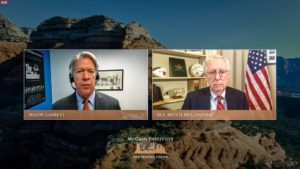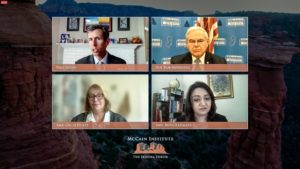By Scott Bordow, Reporter, ASU News
Read the original version of this article at ASU News.
The shifting role of Congress, the United States’ withdrawal from Afghanistan and the intersection of migration and human trafficking were among the topics discussed Thursday during the first day of the Sedona Forum, put on by the McCain Institute for International Leadership at Arizona State University.
The forum, which runs through Saturday, gathers national and international leaders for panel discussions and features more than 70 guest speakers, including FBI Director Christopher Wray and former Ukraine President Petro Poroshenko.
Here’s a look at four of Thursday’s panels:
American leadership at home and abroad
Moderator: CBS News Chief Washington Correspondent Major Garrett
Panelist: U.S. Sen. Mitch McConnell

The bulk of the conversation between Garrett and McConnell was focused on the war between Ukraine and Russia.
McConnell said Russian President Vladimir Putin made a strategic mistake in thinking the invasion of Ukraine would splinter NATO.
“It’s done just the opposite,” McConnell said. “NATO is the most unified it’s been. … I think one good thing that has come out of it is this is the most unified and determined NATO since it was established in 1949.”
McConnell said a potential threat to NATO’s strength was eliminated when President Emmanuel Macron won reelection in France over Marine Le Pen, a far-right, pro-Putin candidate. In addition, McConnell said, Germany, which has been “rather neutral” since the end of World War II, “seems to have evolved into a role more consistent with the needs of the free democratic world.”
McConnell said he believes Ukraine can win the war without direct involvement of U.S. troops or air combat but added that “we need to stick with them and not lose interest if it turns into a long slog.”
As for how he would define a Ukraine victory and whether that might involve giving up eastern parts of the country to Russia, McConnell said, “Definition of victory in my view is whatever President (Volodymyr) Zelenskyy says victory is. I think that’s his call to make, not ours.”
McConnell said he’s hopeful that China President Xi Jinping will think about Ukraine’s resistance and NATO’s support when he considers escalating his country’s conflict with Taiwan.
“First, I hope President Xi is looking at this and concluding that taking Taiwan would not be risk-free in terms of commercial relationship with NATO countries,” McConnell said. “China is much more integrated in the world economy, much more dependent, and would he like to be subject to all the sanctions? Number two, Russia has discovered Ukraine is willing to put up a fight. I hope the message (Xi) is taking out of this is that it’s a lot better to not be a pariah in the international community.”
McConnell said it’s “disappointing” that India is “sitting on the fence,” in regard to Russia’s invasion of Ukraine.
“It’s not too late for the Indians to take another look at this and come out on the right side,” he said.
The changing world order and how to navigate times ahead
Moderator: Mi-Ai Parrish, Sue Clark-Johnson Professor for Media Innovation and Leadership at Arizona State University
Panelist: Ray Dalio, chairman of Bridgewater Associates, an asset management firm
Dalio, whose book “Principles for Dealing With the Changing World Order” was released late last year, said he’s alarmed by the lack of civility in society and politics.
“We are in the early stages of a civil war,” Dalio said. “The idea of a Ronald Reagan and (former U.S. House of Representatives Speaker) Tip O’Neill sitting together over a couple of glasses of scotch and having the country interest be paramount ceases to exist.
“We see that in the number of moderates who have chosen not to run for reelection in primaries. We see much more extremism. In the general election, they will fight to win and not compromise. I don’t think John McCain could get elected today because of the nature of what has happened. There are people in the middle who we need to work things out. We need to find a leader for the whole country. Until then, the polarity that exists becomes more and more intense until there is a war.”
Dalio said that lack of civility and compromise is fed when populism germinates.
“When you have people who are just angry and want to be taken care of, they may not be as cerebral as they are visceral, and they want to fight. When causes people are behind are more important to them than the system, the system is in jeopardy, and that’s where we are.”
Dalio also addressed the war in Ukraine, saying, “It’s part of a greater story in which the world is being bifurcated and not dominated by a single power. … You see this world of polarity starting to line up.”
Dalio called Russia’s invasion of Ukraine a “test war” in that it’s a test of the weight and effectiveness of American sanctions.
“The greatest weapon the United States has — the only unique weapon anymore — is the power of economic sanctions,” he said. “Will they change the outcome?
“We’re learning three things at this point. First, will Putin and Russia win this war? I’ll define winning the war as being able to have control of the southeastern part of Ukraine and getting territory. Number two, is the impact of the sanctions on Russia less than intolerable? Number three, (Putin) remains in power. If those things exist, he would have a win, and the cost of it would have been worth it.”
Exploring the impact of the US pullout of Afghanistan on human rights in the region and on the future of democracy abroad
Moderator: Paul Fagan, McCain Institute senior director for human rights and democracy programs
Panelists: U.S. Sen. Bob Menendez; Greta Holtz, former U.S. ambassador to the Sultanate of Oman; and Roya Rahmani, former Afghan ambassador to the United States

For the better part of an hour, Menendez, Holtz and Rahmani expressed concern that the rights won during the U.S.’ 20-year occupation of Afghanistan – most notably, schooling for girls and young women – will be lost now that the Taliban has control of the country.
“We have to make clear to the Taliban that if it doesn’t observe the reforms that took place in Afghanistan, particularly the advancement of women, education of girls, creation of a civil society, the assistance they seek will simply not flow,” Menendez said.
“The Taliban wants recognition. That’s a big thing. I don’t think it should be given until and if we see them act in ways that meet our concerns for human rights and try to preserve the human rights that we were able to promote the 20-plus years we were there with our allies.”
The problem, Rahmani said, is that the Taliban is unconcerned about those rights.
“They do not care necessarily about the same things the rest of the world would expect a normal government to care about,” she said. “They do not care about the will of the people. When we are talking about human rights that need to be recognized, the Taliban politically rejects it because it’s a Western construct.”
Holtz said the U.S. needs to appeal to the “moderates” – she used air quotes – among the Taliban and work with Afghanistan’s neighboring countries who can give the Taliban some of what it wants.
“The Taliban are 100% transactional,” Holtz said. “They want an international airport. Neighboring countries in Central Asia have leverage with trade routes and border issues. The new Pakistani government has indicated a willingness to work with us to get the Taliban to be more moderate.”
Said Menendez: “I believe we can generate points of leverage.”
Rahmani said change in Afghanistan could come from within because the country the Taliban inherited after the U.S. withdrawal is not the same country it was 20 years ago.
“I’m hoping that we will continue to see those fruits of investments that were made the past 20 years simply because the educated cannot ever be uneducated again,” she said. “There is a huge population back there that still very much strives for different values. … People now want really nothing more than for their children to be educated, to go to school. That was not the case before, and that’s certainly an opportunity.”
That said, Rahmani expressed concern that the rest of the world will forget about Afghanistan and let it be “completely isolated under this tyrant regime.”
“If we drop the ball, it is an injustice for the people of Afghanistan,” she said. “Let’s not treat it as a hopeless cause.”
The intersection of migration and human trafficking
Moderator: Kristen Abrams, McCain Institute senior director for combating human trafficking programs
Panelists: Neha Misra, Solidarity Center; Tim Roemer, director of the Arizona Department of Homeland Security; Jessica Caplin, protection officer with the U.N. Refugee Agency working with Ukrainian migrants
Caplin, who is on the ground in Poland, said the refugee flow out of Ukraine has dramatically slowed since the start of the war, when more than 100,000 people were crossing over the border and into Poland every day. Currently, that number is about 25,000 people per day.
Caplin also said Poland has done a much better job of vetting refugees. In the first few days of the war, she said, children would cross the border with adults who were not verified kinship.
“Maybe it was just a neighbor parents handed their child off to,” she said.
Now, Caplin said, regulations in place prohibit a child who is accompanied by someone who’s not a parent or legal guardian to cross the border without identifying the child and trying to check with his/her parents.
That said, the risk of human trafficking remains high. Misra said refugees need money and jobs and, “unfortunately in this situation, it’s easy for people to take advantage of you. You’ll see a lot of situations of wage theft, of people being forced to work for food and shelter, which are indicators of forced labor.”
Said Abrams: “When there is vulnerability, there are people who will exploit that vulnerability.”
Caplin said that the chaotic scene at the Ukraine-Poland border gives people who “don’t pass a sniff test” the opportunity to prey on migrants.
“Anybody can set up a tent on the border and pretty much offer anything. The risk factors are all there,” Caplin said. “At the border there are signs that say, ‘Don’t get into a strange person’s car,’ ‘Aid is free,’ ‘Don’t let somebody take your passport.’ Access to that information can be a life-saving measure.”
Roemer said there are refugees being exploited every day on the U.S.-Mexico border. He noted that the Sinaloa drug cartel profited $3 billion in 2021 from its human smuggling operations.
“Nobody can migrate across the border without a paying a fee to the cartel,” he said. “They don’t care about harming human beings or killing human beings in the process. They’re in it to turn a profit.”
Read the original version of this article at ASU News.